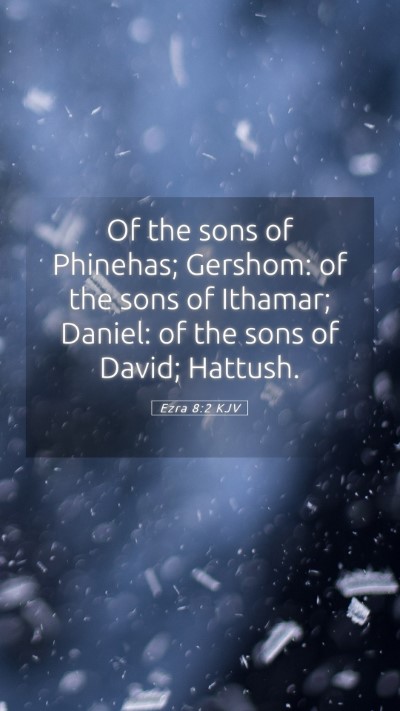Understanding Ezra 8:2
Ezra 8:2 reads: "Of the sons of Phinehas; Gershom: of the sons of Ithamar; Daniel: of the sons of David; Hattush." This verse provides vital information regarding the lineage of the leaders and contributors to the return of the exiles from Babylon to Jerusalem. Below, we explore the insights drawn from public domain commentaries on this verse, aiding in a comprehensive understanding of its significance.
Bible Verse Explanations
The mention of specific names in these genealogies is crucial in highlighting the restoration of proper worship in Jerusalem after the Jewish exile.
- Matthew Henry Commentary: Matthew Henry emphasizes the importance of the priestly lineage, noting that Gershom's line relates to Levite leadership, signifying the restoration of priestly duties and proper worship among the returning exiles.
- Albert Barnes Notes: Barnes points out that the names listed not only provide historical context but also serve to remind the Jewish people of their rightful heritage and the importance of their ancestors in maintaining faithfulness to God.
- Adam Clarke Commentary: Clarke goes further to connect the significance of each name with past events, noting that the lineage can be traced back to significant biblical figures, reflecting on the continuity of God's covenant through generations.
Historical Context
Understanding the historical context of this verse is crucial for proper interpretation:
- Ezra was a scribe and priest who played a pivotal role in reestablishing the law and worship practices for the Jewish people returning from exile.
- Phinehas is noted for his zealous action in the face of idolatry among the Israelites, representing a commitment to holiness that is echoed in Ezra's own mission.
- Ithamar and David's descendants reflect the monarchy and leadership roles crucial for re-establishing the nation of Israel.
Bible Study Insights
When conducting a Bible study on Ezra 8:2, several insights emerge:
- This verse serves as a reminder of the significance of heritage and the continuity of God's plan through generations.
- The careful construction of genealogies sets a precedent for the importance of maintaining record and identity among God's people.
- In modern application, believers are called to consider their own spiritual heritage and how they can contribute to the kingdom of God today.
Commentary Overview
Throughout biblical commentary, Ezra 8:2 is often linked to broader themes in scripture:
- Leadership: The roles of Gershom, Daniel, and Hattush are indicative of diverse leadership emerging in the reformation of Israel after their return.
- Faithfulness: Each name serves as a testament to fidelity in difficult times, reflecting on the faith that sustains God's people.
- Community Restoration: The gathering of these leaders points to the collective effort required to restore community and worship in Jerusalem.
Cross References
Ezra 8:2 can be understood in light of several other biblical passages:
- Numbers 24:15-17 - This passage emphasizes the lineage and prophecy related to Israel.
- 1 Chronicles 6:1-15 - A detailed lineage of the Levites providing context to Ezra's genealogical listings.
- Nehemiah 12:1-26 - Further genealogical records and the restoration of priestly service in Jerusalem.
Conclusion
Ezra 8:2 reveals not just a list of names but a significant connection to the identity and mission of God's people. Through genealogies, the verse compels modern believers to understand their spiritual heritage and encourages responsibility in their walk of faith. By diving deeper into such passages, individuals can cultivate a greater appreciation for Scripture, enhance their Bible study practices, and apply the lessons to their daily lives.


